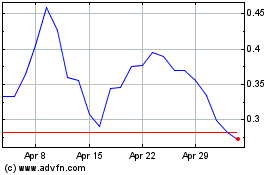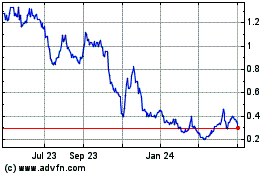Researchers Report That Oral Phenoxodiol Slows Disease Progression in Late-Stage Prostate Cancer Patients
November 22 2004 - 8:29AM
PR Newswire (US)
Researchers Report That Oral Phenoxodiol Slows Disease Progression
in Late-Stage Prostate Cancer Patients WASHINGTON, Nov. 22
/PRNewswire-FirstCall/ -- Marshall Edwards, Inc., today released
the final results of a small-scale clinical study of the
investigational anti-cancer drug, phenoxodiol, in patients with
hormone- refractory prostate cancer (HRPC). The results, presented
on the evening of November 19 to the American Association of Cancer
Research (AACR) conference on Basic, Translational and Clinical
Advances in Prostate Cancer, held in Bonita Springs, Florida,
showed that phenoxodiol has a potent ability to slow down the rate
of cancer progression as evidenced by PSA levels and clinical
status. Phenoxodiol (oral dosage formulation) is being developed as
a treatment for HRPC, both as a first-line chemotherapy, and as a
second-line chemotherapy for patients who have failed to respond to
docetaxel. Phenoxodiol is an investigational drug and has not been
approved for marketing by FDA. Under U.S. law, a new drug cannot be
marketed until it has been investigated in clinical trials and
approved by the FDA as being safe and effective for the intended
use. About the study The Phase Ib/IIa clinical study was conducted
in two Australian hospitals. Nineteen men with HRPC were treated
with phenoxodiol daily for 3 weeks each month for 6 months. All men
had advanced, metastatic disease, and entered the trial with rising
PSA levels. The primary objectives of the study were to examine (a)
the safety and tolerability of phenoxodiol in men with HRPC, (b)
the ability to maintain a steady-state of phenoxodiol in the blood,
and (c) the effect of phenoxodiol on PSA levels and disease
progression. The main purpose of the study was to provide evidence
of a clinical benefit that would justify conducting a large-scale
study to determine the ability of phenoxodiol to reduce tumor
progression. Another purpose was to determine an appropriate dosage
of phenoxodiol to be used in such a study. Patients received one of
four different dosages of phenoxodiol -- 20, 80, 200 or 400 mg each
8 hours. There were between 4 and 6 patients per dose stratum.
Treatment continued for 6 months or until disease progression.
Patients who were considered to have derived a clinical benefit
from phenoxodiol after 6 months of therapy were continued on 200 mg
phenoxodiol until disease progression. About the results
Phenoxodiol produced a dose-response effect in terms of disease
progression and PSA levels, with the 20 mg dose producing no
discernible effect, the 80 mg dose an intermediate effect, and the
200 and 400 mg doses producing a marked effect. The clinical effect
of phenoxodiol was measured in two standard ways -- (i) the
proportion of patients at 6 months who had shown disease
progression (determined on the basis of time to PSA levels being
greater than 25% higher than base-line and/or on the basis of
clinical determination), and (ii) PSA response (greater than 50%
fall in PSA level compared to base-line for at least 4 weeks'
duration). Increasing doses of phenoxodiol resulted in a
progressive and marked increase in the time taken for the disease
to progress. In the 20 and 80 mg dose groups, all patients had
shown disease progression by the end of the study, with average
times to progression of 10 and 17 weeks, respectively. However, in
the 200 and 400 mg dose groups, 2 of 4 and 3 of 4 patients
respectively had no evidence of disease progression at 6 months.
The PSA levels in these 5 patients without disease progression at 6
months were at or below baseline levels. A PSA response generally
is regarded as indicative of tumor response. Two of four patients
in the 200 mg dose group, and 3 of 4 patients in the 400 mg dose
group showed a PSA response, which taken together with the disease
progression data suggests that phenoxodiol monotherapy is exerting
a significant anti-tumor effect in these late-stage,
hormone-refractory cancers. Phenoxodiol was well tolerated in all
patients, with no toxicities being reported, including at dosages
of 400 mg administered for 6 months, followed by 200 mg for up to a
further 18 months. The 8-hourly dosing schedule also proved
effective at providing steady- state plasma levels of phenoxodiol
with no long-term accumulation of drug at any of the four dosages.
Professor Graham Kelly PhD, Chairman, Marshall Edwards, Inc., who
presented the data at the conference on behalf of the
investigators, said, "These results give us optimism that with
phenoxodiol we can slow the rate of tumor progression to the point
where we can make a real difference to the survival of men with
such advanced cancer. Current therapies offer only modest
extensions of life to about half of the patients with HRPC, but at
the cost of significant toxicity to most men receiving the
treatment. Our aim with phenoxodiol is to deliver meaningful
prolongation of life in a significant number of patients, with
little or no toxicity." A Phase IIb/IIIa multi-center,
international, clinical trial known as the COMPACT (Comparison of
Phenoxodiol Against Conventional Therapy) Study in men with HRPC
using a phenoxodiol dosage of 400 mg currently is being
established. About prostate cancer Prostate cancer is one of the
most common types of cancer among American men. According to the
American Cancer Society, over 230,000 American men will be
diagnosed with prostate cancer in 2004, and approximately 29,900
American men will die from the disease. Prostate cancer is strongly
associated with the male sex hormone, testosterone, and most early
cases of prostate cancer respond for some time to hormonal therapy
that blocks the ability of testosterone to stimulate the cancer.
However, the majority of cases of prostate cancer eventually become
independent of testosterone, at which time they are known as
hormone- refractory prostate cancer (HRPC). The cancer at this
stage typically is metastatic, with a patient survival time
typically in the range of 1 to 2 years. The FDA recently approved
the combination of docetaxel (Taxotere(TM)) and prednisone for the
treatment of HRPC. That combination produces a PSA response in 45%
of patients, although the tumor response rate is only 12% and the
overall increase in survival in all patients is 10 weeks (from an
average of 16.4 months to an average of 18.9 months).(1,2) About
phenoxodiol Phenoxodiol is an investigational product designed to
block the key pro- survival signaling messenger,
sphingosine-1-phosphate. As a consequence of this, the prostate
cancer cell is both blocked from dividing or increasing in number
(cytostasis) and induced to undergo apoptosis or programmed
cell-death (cytotoxicity). Phenoxodiol is believed to target the
cell membrane enzyme, tNADH oxidase, which regulates the production
of sphingosine-1-phosphate. The restriction of tNADH oxidase to
cancer cells accounts for the highly selective effect of
phenoxodiol on cancer cells. About Marshall Edwards, Inc.
Phenoxodiol, an isoflavonoid ring structure, is being developed by
Marshall Edwards, Inc., (Nasdaq: MSHL; LSE AIM: MSH) which has
licensed rights to bring phenoxodiol to market globally from
Novogen Limited, an Australian biotechnology company based in
Sydney, Australia (NASDAQ:NVGN)(ASX:NRT). More information on
phenoxodiol and on Marshall Edwards can be found at
http://www.marshalledwardsinc.com/. References. 1. Tannock IF, et
al. (2004) New Eng J Med 351, 1502-1512. 2. Petrylak DP, et al.
(2004) New Eng J Med 351, 1513-1520. Statements included in this
press release that are not historical in nature are
"forward-looking statements" within the meaning of the "safe
harbor" provisions of the Private Securities Litigation Reform Act
of 1995. You should be aware that our actual results could differ
materially from those contained in the forward-looking statements,
which are based on management's current expectations and are
subject to a number of risks and uncertainties, including, but not
limited to, our failure to successfully commercialize our product
candidates; costs and delays in the development and/or FDA
approval, or the failure to obtain such approval, of our product
candidates; uncertainties in clinical trial results; our inability
to maintain or enter into, and the risks resulting from our
dependence upon, collaboration or contractual arrangements
necessary for the development, manufacture, commercialization,
marketing, sales and distribution of any products; competitive
factors; our inability to protect our patents or proprietary rights
and obtain necessary rights to third party patents and intellectual
property to operate our business; our inability to operate our
business without infringing the patents and proprietary rights of
others; general economic conditions; the failure of any products to
gain market acceptance; our inability to obtain any additional
required financing; technological changes; government regulation;
changes in industry practice; and one-time events. We do not intend
to update any of these factors or to publicly announce the results
of any revisions to these forward-looking statements. DATASOURCE:
Marshall Edwards, Inc. CONTACT: Chris Naughton, Australia, of
Marshall Edwards, Inc., +011 61 2 9878 0088; or David Sheon, USA,
+1-202-518-6384 (office), or +1-202-422-6999 (cell), for Marshall
Edwards, Inc. Web site: http://www.marshalledwardsinc.com/
Copyright
Kazia Therapeutics (NASDAQ:KZIA)
Historical Stock Chart
From Jun 2024 to Jul 2024

Kazia Therapeutics (NASDAQ:KZIA)
Historical Stock Chart
From Jul 2023 to Jul 2024
